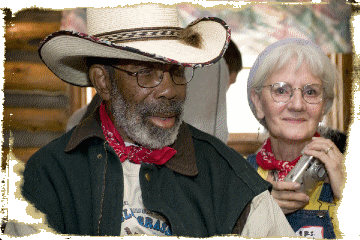Banjo Curriculum for Public Schools
Creating a Banjo-based Music Curriculum for the Septima Clark Public Charter School in Washington DC
I have been asked to create a banjo based music curriculum for an innovative charter school for boys in Washington DC. This will be administered and taught by volunteers who love the banjo and seek to serve the community.
The inspiration for this project comes primarily from my experience as a volunteer with Jam Pak Blues 'N' Grass Neighborhood Band, a neighborhood band in Chandler Arizona. Anni and Vincent Beach began teaching music out of their home to neighborhood children over 15 years ago. I have been a volunteer banjo teacher with Jam Pak for eight years. The Jam Pak band is a featured act at virtually all bluegrass festivals in Arizona.

Jam Pak founders, Anni and Vincent Beach


Jam Pak Band onstage at a bluegrass festival
Jenny Du Fresne, daughter of Anni Beach, is the Founder/Head of School at Septima Clark Public Charter School for boys, in Washington DC. She would like to create a music program in her school based on traditional music with an emphasis on the five-string banjo.
African-American artists such as Otis Taylor, Sule Greg Wilson (Sule is an advisor on this project), the Carolina Chocolate Drops and the Ebony Hillbillies all agree that the time has come for African-Americans to embrace the banjo. Otis Taylors's recent project "Reclaiming the Banjo" is a prime example. Taj Mahal has been an important banjo player for decades. The banjo because of its open tuning makes it possible for young players to make music immediately.
Note that the curriculum developed for this initial project will be applicable in any school. Due to the particular circumstances of Jenny's school, I will address the connection between the banjo and African-American traditions and history.
Jam Pak has never received any grants or public funding. Jam Pak has never sponsored a fundraising event. However, based on the good work and good will of the community (the bluegrass community in particular) it has received instrument donations and money spontaneously.
This does not preclude seeking funding, but the basic model for success depends upon volunteerism.
Curriculum
It is essential that a predictable curriculum be established and distributed to volunteers. This will make it possible to distribute the task of teaching and keep lessons on a consistent path. I will create a curriculum based on the consensus of those who have volunteered as advisors and offer lessons on DVD. It is possible that, in a pinch, lessons could be administered by a non-banjo-playing teacher or volunteer by using the DVD as an instructional tool.
Septima Clark Public Charter School
Below is a drawing of a prototype I will build soon using a paint bucket lid for the sound board.

A famous business motto is "nothing succeeds like success." Once Septima Clark demonstrates success with the initial starter instruments, donations are sure to follow.
Sule Greg Wilson, a key advisor for this project, suggested that we include African and Afro-Caribbean material. We experimented with banjo and percussion and the blend was dynamic. Since the school currently has a djembe teacher it may be possible to bring banjo and djembe into a unique blend.